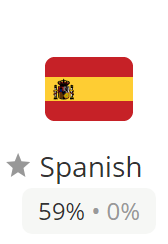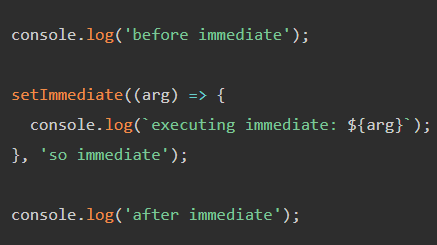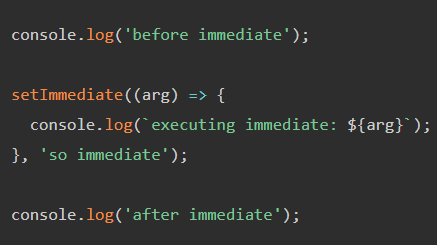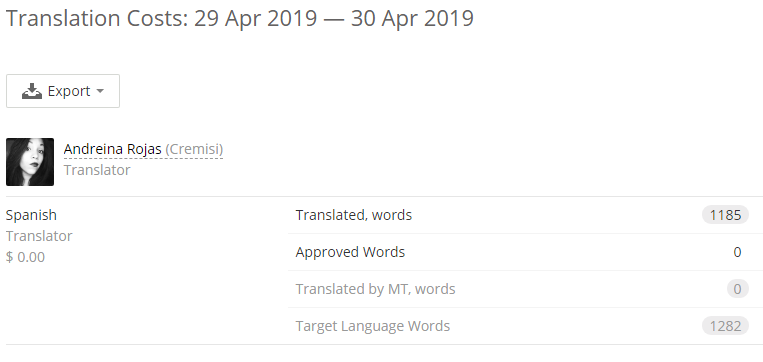
Repository
https://github.com/nodejs/i18n
Project Details
Node.js is an open-source, cross-platform JavaScript run-time environment that executes JavaScript code outside of a browser.
Node.js came into existence when the original developers of JavaScript extended it from something you could only run in the browser to something you could run on your machine as a standalone application.
In simple words, it's an open source execution environment for developing web applications, which is event-based, it uses the V8 engine to provide an execution environment that compiles and executes JavaScript at a higher speed. It is possible to run Node.js without any restriction on Windows, Linux and Mac OS X.
It should be noted that it is NOT a server language, this means that it executes code, so it could be understood as an interpreter.
Contribution Specifications
Node.js is currently being translated into 33 languages. I'm contributing to translate it into the Spanish language.

Translation Overview
For this contribution, I translated the folder Timers-in-node.md.
The Timers module in Node.js contains functions that execute code after a set period of time.
When we talk about timers, their meaning is not at all different from the concept we already know: it allows us to program the activation or deactivation of different devices in a simple way; in this case, to program functions so that they execute the code when it's required.

Timers do not need to be imported from a particular function, since all the methods are available globally to emulate the browser JavaScript API.
For example, setTimeout() can be used to schedule code execution after a designated amount of milliseconds. setTimeout() accepts a function to execute as its first argument and the millisecond delay defined as a number as the second argument. Additional arguments may also be included and these will be passed on to the function.

The above function myFunc() will execute as close to 1500 milliseconds (or 1.5 seconds) as possible due to the call of setTimeout().
As an example of the work done, I will leave a fragment of the execution of the setImmediate() function explained in this module:
setImmediate() will execute code at the end of the current event loop cycle. This code will execute after any I/O operations in the current event loop and before any timers scheduled for the next event loop. This code execution could be thought of as happening "right after this", meaning any code following the setImmediate() function call will execute before the setImmediate() function argument.
The first argument to setImmediate() will be the function to execute. Any subsequent arguments will be passed to the function when it is executed. Here's an example:

The above function passed to setImmediate() will execute after all runnable code has executed, and the console output will be:

setImmediate() returns and Immediate object, which can be used to cancel the scheduled immediate.
setImmediate() ejecutará el código al final del ciclo del bucle de eventos actual. Este código se ejecutará después de cualquier operación de I/O en el bucle de eventos actual y antes de cualquier temporizador programado para el siguiente bucle de eventos. Podría pensarse que esta ejecución de código ocurre "justo después de esto", es decir, cualquier código que siga a la llamada de la función setImmediate() se ejecutará antes del argumento de la función setImmediate().
El primer argumento para setImmediate() será la función a ejecutar. Cualquier argumento posterior se pasará a la función cuando se ejecute. Aquí hay un ejemplo:

La función anterior pasada a setImmediate() se ejecutará después de que se haya ejecutado todo el código ejecutable, y la salida de la consola será:

setImmediate() devuelve un objeto Immediate, que se puede utilizar para cancelar el immediate programado.
Languages
This contribution was translated from English to Spanish.
Word Count
The number of words reflected in the title doesn't include words that didn't require a translation.
- In this contribution, I've translated 1126 words.
- I've translated a total of 80767 words so far*
*Considering non-translatable content (proper names, functions, codes, etc.)
Previous translations on this project
- Maintaining-V8.md (v6.x)
Part 56
Part 53
Part 52
Part 13
- Maintaining-V8.md (v10.x)
Proof of Authorship

This counter includes non-translatable words, so it is necessary to work on more content to extract an average of 1000 translatable words.
You can check My Crowdin Profile for verify my contribution in this project.
Hi @cremisi,
Thank you for submitting your contribution!
This is a very interesting project that contains many code values and terms related to computer science. Its difficulty relies on the fact that we must pay a lot of attention to the code in order to deliver the most accurate translation possible.
The overall presentation of your post is great, it is well written and formatted, includes all the basic details, useful examples and concepts. Kudos for adding your personal touch to the report :)
You delivered an accurate translation. You used the correct vocabulary and you were careful with code values that should not be translated in order to make sure the text keeps its true meaning.
Keep up the good work!
Your contribution has been evaluated according to Utopian policies and guidelines, as well as a predefined set of questions pertaining to the category.
To view those questions and the relevant answers related to your post, click here.
Chat with us on Discord
Thank you for your review, @marugy99! Keep up the good work!
Hey, @cremisi!
Thanks for contributing on Utopian.
We’re already looking forward to your next contribution!
Get higher incentives and support Utopian.io!
Simply set @utopian.pay as a 5% (or higher) payout beneficiary on your contribution post (via SteemPlus or Steeditor).
Want to chat? Join us on Discord https://discord.gg/h52nFrV.
Vote for Utopian Witness!